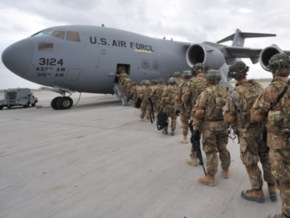
There will be no war with Iran in President Obama's second term. As a result of his reelection, Obama is now in an unassailable position to prevent the outbreak of any conflict with Tehran and, as a leader averse to further wars (as in Afghanistan and Iraq), he will not seek one. Here are the reasons why:
First, Obama immediately inherits a huge breathing space on the Iranian issue to pursue negotiations with the Iranians. This is because the Israeli leadership has already indicated (under goading from President Obama) that it will wait on considering any action against Iran's nuclear facilities until at least next year. Israel's Prime Minister Benjamin Netanyahu told the United Nations General Assembly on September 27th that, in his view, the crucial time for mounting action against Iran should not come until sometime in the Spring of 2013.
In addition, Israel's Defense Minister, Ehud Barak, himself stated last week in an interview with the London�Daily Telegraph�that he does not foresee Iran acquiring enough bomb grade fuel for a primitive atomic bomb at least until at least the summer of 2013, "delaying the moment of truth by 8 to 10 months." Furthermore many of the most important intelligence and security leaders in Israel, including a possible new potential opponent for Netanyahu, former Prime Minister Ehud Olmert, have publicly decried war with Iran. All of these utterances provide additional time for the US to continue talks with the Iranians for an agreement in which UN sanctions will be dropped if Iran discards the bomb.
Second, at home President Obama, as a term-limited leader, no longer need take into consideration the fierce pressures from Republicans in Congress and a hawkish Jewish constituency to support the Netanyahu government on Iran. Now Obama can now act without political considerations. He barely survived an imbroglio last summer with Israel over Iran. Just before Netanyahu came to New York City for last Fall's UN meeting, the Israeli Prime Minister openly challenged Obama over his willingness to initiate military action against Iran. Netanyahu's stirring of the pot at that time led to attacks from Republicans and from pro-Netanyahu Jewish organizations against Obama as not being supportive enough of Israel. Obama quieted the storm by restating his unshakeable support for Israel, but was undoubtedly bruised by the controversy.
Third, Obama clearly has the strongest hand yet in the US relationship with Israel with the enhanced political clout of winning a second term. He can now withhold US military support -- most importantly, America's so-called "bunker-busting" bombs that can do real damage to Iranian nuclear sites buried deep in the ground (by contrast, Israel's bombs cannot penetrate to the depths which US weaponry can) -- without suffering overt political damage and instead focus on global measures designed to isolate Iran. This, in turn, leaves Israel in the precarious position of, at best being able to threaten Iran with weaker missiles but without further assurances of US backing. Under those circumstances, will Israel be willing to go it alone, especially with its own domestic opposition growing to an Iranian war?
Fourth, Obama has recourses to the United Nations Security Council, the IAEA, and the UN General Assembly to demonstrate to the planet that he is acting to peacefully dismantle Iran's nuclear facilities. All of these bodies provide public and visible ways to exert world-wide pressure on Iran to end its secret bomb-making work. Undoubtedly Obama will still have to persuade both Russia and China, particularly in the Security Council, to agree to tighter sanctions -- and this will take time. But Obama's re-election has bought him the space he otherwise would not have to pursue deals.
Fifth, finally, it seems highly unlikely, in any case, that Obama on his watch, despite any statements that he has made to the contrary, will want another US intervention in the Middle East after the tragic circumstances of our Iraqi escapade. He is a leader who has shown his intention to withdraw US troops from wars abroad, as in Iraq and Afghanistan, not send more forces overseas. He is focusing his second term on rebuilding America. Thus it seems apparent that Obama will play out the "jaw, jaw, not war, war" scenario throughout his next four years. This means, in practice, he will probably permit continued Iranian ambiguity as to whether it truly possesses a nuclear arsenal. Obama will instead support what amounts, in practice, to a quasi-containment policy toward the Persian state consisting of sanctions, threats, boycotts, planet-wide pressures, but no war.
See further commentary from the Century Foundation Fellows on the US election's consequences�here.
The Iran Project is not responsible for the content of quoted articles.











